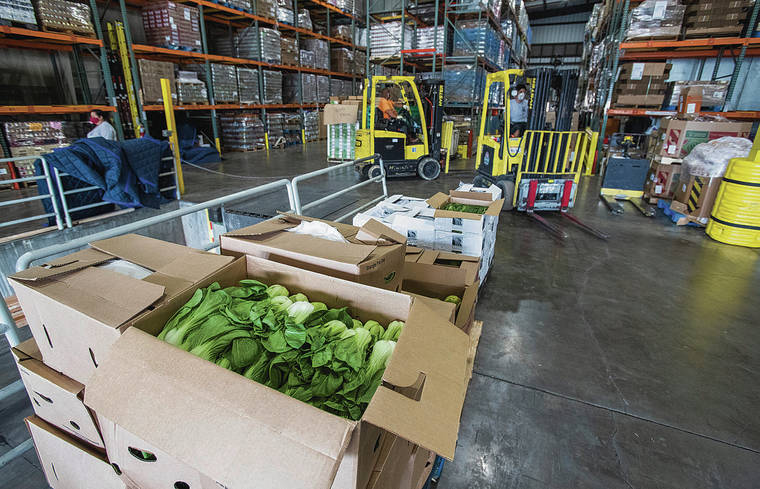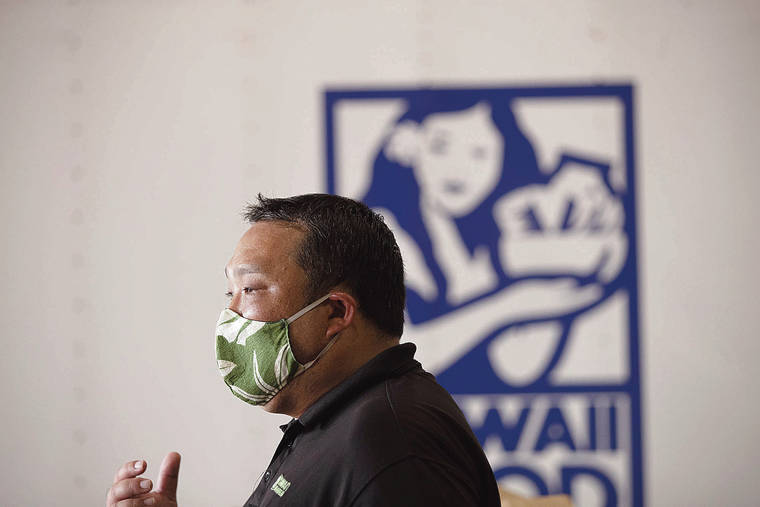More people than ever are reaching out for food assistance in Hawaii during the coronavirus crisis


CINDY ELLEN RUSSELL / CRUSSELL@STARADVERTISER.COM
Boxes of fresh produce were delivered Tuesday by the Hawaii Farm Bureau to the Hawaii Foodbank.

CINDY ELLEN RUSSELL / CRUSSELL@STARADVERTISER.COM
Hawaii Farm Bureau Executive Director Brian Miyamoto on Tuesday discussed the partnership with Hawaii Foodbank. The initiative will provide healthful food to the needy while keeping local farmers in business.



With Hawaii’s economy in the tank due to the coronavirus pandemic, more people than ever are reaching out for food to feed their families.
Food drives and giveaways across the state are drawing huge numbers of people as officials scramble to meet demand.
Ron Mizutani, president and CEO of the Hawaii Foodbank, said the situation is causing him sleepless nights.
“I can see the shelves getting empty, and it really scares me,” Mizutani said from his office. “But we’ve been able to weather the storm so far.”
Demand on the Hawaii Foodbank has increased by about 56% since mid-March. Ordinarily, the food bank distributes nearly 1 million pounds of food every month. But, he said, the organization is on pace to nearly double that total for April.
Photo Gallery: Hawaii Foodbank and Hawaii Farm Bureau partner to provide healthy food to those in need Opens in a new tab
Don't miss out on what's happening!
Stay in touch with breaking news, as it happens, conveniently in your email inbox. It's FREE!
“This is unprecedented. The needs are incredible,” Mizutani said.
At the Salvation Army, demand has soared from 10,000 food boxes or meals a month before the COVID-19 crisis to 12,000 per week.
And that doesn’t even count Saturday’s huge drive-thru giveaway at Ala Moana Center, where eggs, bread, milk and potatoes were handed out to thousands in need who waited in a line miles long.
“We expected it to be big. No one knew the line was going to be that long,” said Victor Leonardi, the Salvation Army’s incident commander for COVID-19 response in Hawaii and the Pacific islands.
A recent food drive at the Kroc Center in Kapolei may have offered a hint. People started lining up two hours before it was to start. When it did start, 400 bags of food disappeared in 13 minutes, he said.
Leonardi said all 140 Salvation Army food locations in Hawaii are experiencing increases in weekly demand, and some locations are seeing double and triple.
“This has thrown everybody for a loop,” he said.
Business is booming at Aloha Harvest, Hawaii’s largest nonprofit that rescues excess quality food for delivery to shelters, food pantries and transitional homes.
On a typical week the organization rescues 25,000 to 30,000 pounds of food from grocery stores, restaurants, events and other food venues. Since the start of the coronavirus emergency, that number tripled in two weeks, fueled by numerous business closings and event cancellations and prompting Aloha Harvest to expand to eight trucks from three, said “Phil” Augustus Acosta, executive director.
While demand has since leveled off and could even dry up eventually, Acosta said he expects that work serving the island’s hungry will only be in greater demand in the weeks and months ahead, and Aloha Harvest is already evolving to meet the increasing needs.
“Unfortunately, the economic impact will far outlast the public health crisis,” Acosta said.
Hawaii has seen more than 200,000 unemployment claims since the state shut down under emergency orders last month. When the schools closed, families who relied on free or subsidized school meals to keep their children fed began facing even greater need.
Mizutani said Hawaii Foodbank typically spends $33,000 a month on food purchases. In the last four weeks alone, the agency has spent $640,000 on food and supplies to help deal with the COVID-19 emergency. In April, he said, the food bank is projecting to spend another $350,000 to $500,000 to meet the growing demand.
Mizutani said the crisis is only making it harder to fulfill the food bank’s mission. Many of the organizations that usually donate large volumes of food have shut down. Restaurants and hotels have closed their doors, while some grocery stores, which ordinarily share unsold inventory nearing its best-by date, have little to donate because of their own demands.
What’s more, Hawaii Foodbank is experiencing a sharp decline in its volunteer labor force, he said, because many of the volunteers are older folks who need to shelter at home for their own health and safety.
“Our warehouse is operating as efficiently as possible, but there are many pukas in our shelves,” Mizutani said.
The challenge right now is getting food to Hawaii as quickly as possible. There are seven containers of rice and other food items on order, he said, but “the trip across the Pacific Ocean is something we have no control over.”
In the meantime Hawaii Foodbank on Tuesday announced a partnership with the Hawaii Farm Bureau that will help keep farmers farming and ranchers ranching while boosting the agency’s food assistance programs.
Under the program, Hawaii Foodbank committed to purchase $200,000 in local agricultural products.
Several foundations are supporting the initiative, including the Harold K.L. Castle Foundation, Hawaii Community Foundation, Ulupono Initiative and Harry and Jeanette Weinberg Foundation.
“Thanks to various grants and other funding, these food purchases by Hawaii Foodbank will provide much needed income to farmers and ranchers and allow them to continue their operations. In turn, this partnership ensures these locally grown food products are distributed to those most in need,” Hawaii Farm Bureau Executive Director Brian Miyamoto said in a news release.





